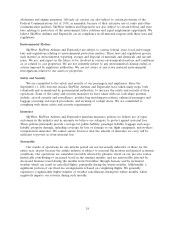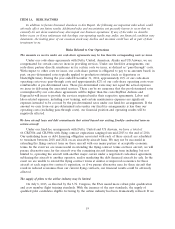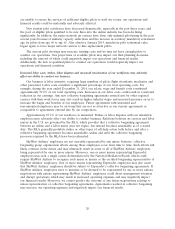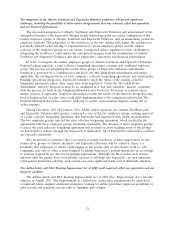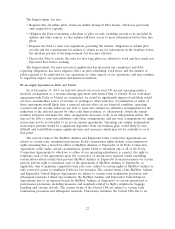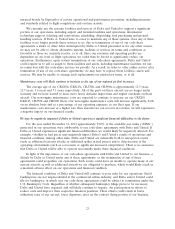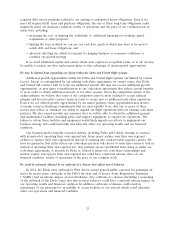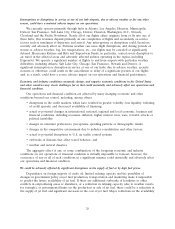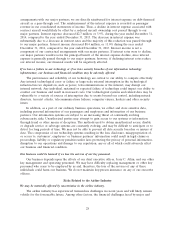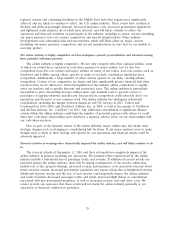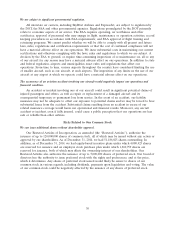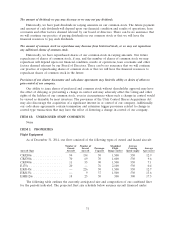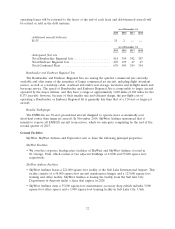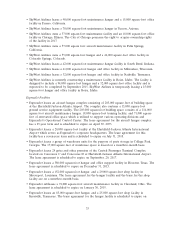SkyWest Airlines 2014 Annual Report Download - page 32
Download and view the complete annual report
Please find page 32 of the 2014 SkyWest Airlines annual report below. You can navigate through the pages in the report by either clicking on the pages listed below, or by using the keyword search tool below to find specific information within the annual report.of jet fuel or significant increases in its cost, or a continuation of high fuel prices for a significant
period of time, would have a material adverse impact on us.
Pursuant to our fixed-fee arrangements, our major partners have agreed to bear the economic risk
of fuel price fluctuations on our contracted flights. However, we bear the economic risk of fuel price
fluctuations on our pro-rate operations. As of December 31, 2014, essentially all of our EMB120s flown
for Delta were flown under pro-rate arrangements, while approximately 57% of our EMB120s flown in
the United system were flown under pro-rate arrangements. As of December 31, 2014, we operated
21 CRJ200s under a pro-rate agreement with United. We also operate ten CRJ200s under a pro-rate
agreement with Delta, one CRJ200 under a pro-rate arrangement with US Airways and 6 CRJ200s
under a pro-rate agreement with American. Our operating and financial results with respect to these
pro-rate arrangements can be affected by the price and availability of jet fuel and in the event we are
unable to pass on increased fuel prices to our pro-rate customers by increasing fares our financial
performance would be adversely impacted.
Reduced utilization levels of our aircraft under our code-share agreements would adversely impact our
financial results.
The majority of our code-share agreements set forth minimum levels of flight operations which our
major partners are required to schedule for our operations and we are required to provide. These
minimum flight operating levels are intended to compensate us for reduced operating efficiencies
caused by production decreases made by our major partners under our respective code-share
agreements. Historically, our major partners have utilized our flight operations at levels which exceed
the minimum levels set forth in our code-share agreements, however, in recent years our major
partners have reduced our utilization to levels which, at times, have been lower than the levels required
by our code-share agreements. If our major partners schedule the utilization of our aircraft below
historical levels (including taking into account the stage length and frequency of our scheduled flights),
we may not be able to maintain operating efficiencies previously obtained, which would negatively
impact our operating results and financial condition. Additionally, our major partners may change
routes and frequencies of flights, which can shorten flight trip lengths. Changes in schedules may
increase our flight costs, which could exceed the reimbursed rates paid by our major partners.
Continued reduced utilization levels of our aircraft or other changes to our schedules under our
code-share agreements would adversely impact our financial results.
There are long-term risks related to supply and demand of regional aircraft associated with our regional
airline services strategy.
Our major airline partners have indicated that their committed supply of regional airline capacity
is larger than they desire given current market conditions. Specifically, they have identified a general
oversupply of 50-seat regional jets under contractual commitments with regional airlines. Delta in
particular has reduced both the number of 50-seat regional jets within its network and the number of
regional airlines with which it contracts. There are currently more than 100 50-seat aircraft within the
Delta Connection system. In addition to reducing the number of 50-seat jets under contract, major
airlines have reduced the utilization of regional aircraft, thereby reducing the revenue paid to regional
airlines under capacity purchase agreements (See the risk factor titled ‘‘Reduced utilization levels of our
aircraft under our code-share agreements would adversely impact our financial results’’ for additional
details). This decrease has had, and may continue to have, a negative impact on our regional airline
services revenue and financial results.
Declining interest rates could have a negative effect on our financial results.
Our earnings are affected by changes in interest rates due to the amount of our variable rate
long-term debt and the amount of cash and securities we hold. Under the majority of our fixed-fee
27



